5 Categories That Will Define the Next Generation Engineer
Cerebral
The engineering role in CRE is changing vastly. An engineer must sharpen his mental abilities as much as his mechanical abilities. In the age of increased reporting and liability, the engineer must be able to improve building efficiency and limit liability while increasing building profitability. The routine maintenance performed in machine rooms and tenant spaces have become just one of the many responsibilities an engineer must fit into his daily routine. Engineers must demonstrate sustainability, efficiency and fiscal responsibility to a property manager and provide a solution that addresses all of these requirements. The demands of commercial real estate are beginning to increase for engineers and in order for them to succeed in this industry they must accept the evolution of our industry and embrace the change.
Ownership
An engineer is no longer just a maintenance man working on equipment and logging chiller readings. They are the face of the company, the first line of defense and the lasting impression on tenants. Engineers have a unique role in CRE and are expected to cover all the bases. An engineer must have the mindset to take ownership of the property and view every decision and action through the scope of personal ownership. Instead of making the easy fix, make the right fix. Think long term as opposed to short term. Ask the question,
How does this reflect on me as a person and as an employee?
Communication
An engineer has always been required to “walk the walk,” but what about “talk the talk”? In the new age of reporting, owner meetings, strategic planning and ROI requirements, an engineer will be required to explain and provide as much detail as possible for all the operations at the property. An engineer must be able to turn a wrench and write an email with the same level of proficiency. An engineer must be able to read schematics and a budget and determine how each work together to improve the property. It is just as important for an engineer to understand and contribute to the long term goals of a property and communicate the impact that decisions will have for the tenants, staff and owners.
Motivation
You can teach someone everything they need to know about a job, but you can’t teach them how to be motivated. Growing up with a father, who also happened to be a chief engineer, preaching that no matter what job you were doing, be the best at it, I still live by this principle. There is no substitute for hard work in this industry and an engineer must be motivated to do his best regardless of the situation and provide quality work at all times. There is something simple yet so pure about doing something right the first time. For me, this all begins with motivation. Are you motivated to take on more responsibility and increase your value personally and professionally? Are you motivated to learn, develop and grow as an engineer? Are you satisfied with your current position or are you looking up the ladder chasing down your dreams? It all begins with motivation. An engineer must have that internal motor that keeps the wheels turning and pushes through to the next level.
Personal Responsibility
Engineers manage million dollar assets and equipment so obviously they show the same amount of responsibility for themselves, right? Engineers should be putting just as much time and energy into their personal development as they do into the success of their building. Ask questions, find answers and be a sponge so you can soak it all up. Make sure you take pride in your appearance as much as your abilities. Research new technology, educate yourself and foster growth. If you want to excel as an engineer, take personal responsibility for your growth and success. Don’t wait for things to happen, go out and make it happen.









